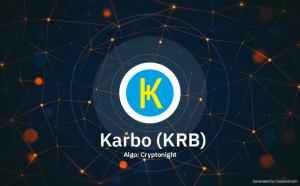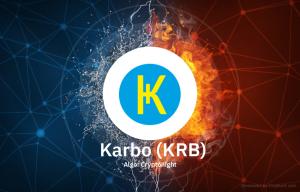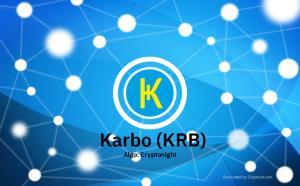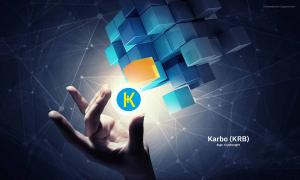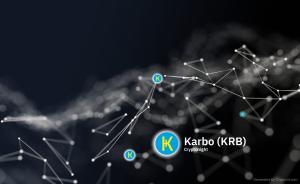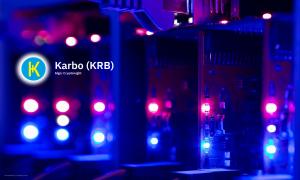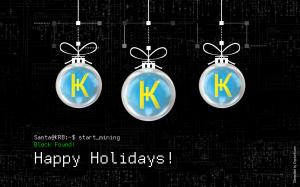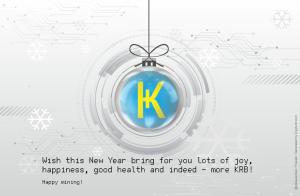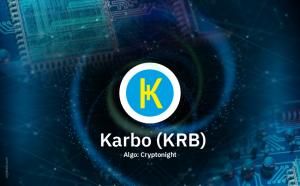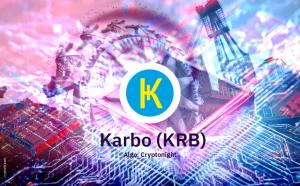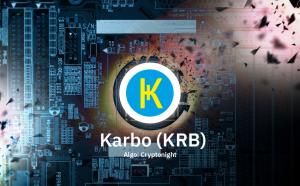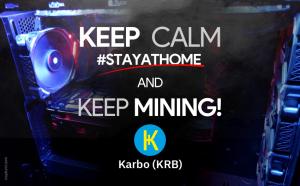Karbo (KRB)
$0
(0%)
0 BTC
0 Mh/s
Hashrate
$0
0 BTC
0 KRB
Last reward
/0
Miners/Pools
HARDFORK AT HEIGHT 700000, 30th of December 2021. Mining algo changed to one which is pool-unfriendly.
Karbo mining pools
| Pool Name | Merged | Fee % | Min Pay | Miners | Mh/s | Status |
|---|
Karbo markets
Currently unknown
Please visit the Karbo website to find out more.
Cryptunit uses data provided by CoinGeckoKarbo
Karbo is a decentralized peer-to-peer exchange network and medium, that does not have centralized management or issuer and ensures privacy and anonymity of operations without intermediaries and regulators. Its units of exchange are cryptographically protected (encrypted) units of information. They are protected from copying and counterfeiting by the blockchain technology.
| Ticker | KRB |
| Announced | Mar 2016 |
| Forked from | |
| Hashing algo | CN ASIC |
| Block time | 0 sec |
| Decimal places | 12 |
| Last reward | 0 |
| Current height | 0 |
| Historical data | JSON |
| CN | 08. Feb 2018 |
| Sep 2022 | |
| Dec 2017 | |
| Dec 2017 | |
| Nov 2017 |
Ticker: KRB
Symbol: Ҝ - Ka with vertical stroke, it is a letter of the Cyrillic script. Its form is derived from the Cyrillic letter Ka (К к) by the addition of a stroke through the short horizontal bar in the centre of the letter.
0% Pre-mine
Mining algorithm: POW, CryptoNight
Max supply: 10 million KRB (+ tail emission ~1% yearly)
Block reward: initial reward of ~38 KRB, slight decrease every block, when decreases to 1 KRB will stay at that level
Block target time: 4 minutes
Difficulty: Retargets at every block
Decimal Points: 12
Low transaction fee: 0.0001 KRB
P2P Port: 32347
Rpc Port: 32348
What is Karbo?
The name "Karbo" is derived from Ukrainian word "karbovanets", that comes from an ancient way of recording settlements or debts by marking wooden stick called "tally stick" or "tally" with a system of notches that was very popular in the Mediaeval Europe from Antiquity up to the first decades of XX century. The stick would be split in half, down its length from one end to the other. The debtor would retain half, called the "foil". The creditor would retain the other half, called the "stock". Because wooden stick has natural and distinctive irregularities, the two halves would match only each other providing simple and effective protection against forgery. The way medieval tally sticks system worked resembles how blockchain works. Hence comes the name "karbovanets" and its shortened version "Karbo".
The "karbovanets" has been a distinct unit of currency in Ukraine during three separate periods in its history. Nowadays it is obsolete and replaced by Ukrainian Hryvnia.
"Karbovanets" therefore is a very well-known word, with very strong associations with "money" not only in Ukraine but also in Russia and other neighboring countries. It sounds familiar to people, which makes it more easy to adopt.
It was resurrected in the digital form of cryptocurrency as people’s unofficial, independent exchange medium.
Our misson
To become "Fourth karbovanets" – People's Digital Exchange Medium
Karbo is based on principles of the Austrian school of economics which emphasizes the spontaneous organizing power of the price mechanism and holds that the complexity of subjective human choices makes mathematical modeling of the evolving market practically impossible. Its scholars eschew what they consider "naïve" and pointless mathematical modeling of the economy, considering much of mainstream economics a form of economic charlatanism. Its proponents tend to emphasize the organic, subjective and evolving nature of market dynamics, advocating the strong protection of private property rights and the strict enforcement of voluntary contractual agreements between economic agents as the best way of facilitating economic exchange, and generally advocate a laissez-faire approach to the economy, arguing that the smallest imposition of coercive force (especially government-imposed force) on commercial transactions is the most effective way to secure long-run economic stability and well-being.
In particular, they voice serious concerns about the distorting and damaging effects of government involvement in commerce, arguing that few government regulations in this area are necessary or desirable and often trigger a "ratchet effect" as problems associated with existing regulations are often blamed on the free market, thereby justifying further damaging, coercive incursions into the market. They are particularly critical of long-standing governmental incursions into the area of private money production, advocating instead the immediate abolition of all coercive legal tender laws and the return to full reserve - or free - banking, where the financial system is decentralized and not dominated or controlled by coercive monopoly government or a monopoly central bank.
One of the most known scholars, Noble Prize laureate, economist and philosopher Friedrich Hayek it it's book The Denationalization of Money states that instead of a national government issuing a specific currency, use of which is imposed on all members of its economy by force in the form of legal tender laws, private businesses should be allowed to issue their own forms of money, deciding how to do so on their own. Hayek advocates a system of private currency in which financial institutions create currencies that compete for acceptance.
Karbo is proposed as one of such free exchange medium – egalitarian, decentralized system with enhanced privacy, where value of its units is based solely on supply and demand in the market, emission depends on constant mathematical algorithm, where everyone can participate in emissions of karbos, receiving them as a reward for the provided computing resources of their regular PC to support the network. For mining expensive specialized equipment (ASIC) is not required.
Fungibility and privacy of Karbovanets
Anonymity is implemented by ring signatures to hide the sender and one-time addresses that are hiding the recipient.
Privacy
Transactions in Karbo are untraceable and unlinkable. Karbo provides complete anonymity and privacy using cryptographic technology ring signatures. All transactions signed on behalf of a group so that it is impossible to determine who exactly from the group signed the transaction and, accordingly, one can not say with certainty who carried out the payment. The more participants in the group, the more confidential operation is. In addition, the transactions cannot be associated, – even if outgoing transactions are untraceable, everyone may still be able to see the transactions you have received. However, by using a variation of the Diffie-Hellman exchange protocol, a receiver has multiple unique one-time addresses derived from his single public key. After funds are sent to these addresses they can only be redeemed by the receiver and it would be impossible to cross-link these transactions.
Fungibility
Unique one-time addresses and ring signatures of transactions are providing resistance to blockchain analysis. Every transaction only increases entropy and creates additional obstacles for those who wish to dig into financial operations with Karbos.
Resistance to the analysis, in turn, provides a very important characteristic inherent in real money, – fungibility. Fungibility of money means that all units of one denomination have the same purchasing power.
Fungibility is the key difference and advantage over Bitcoin. All the karbos are interchangeable and uniform, unlike bitcoins. It is because in Bitcoin everyone can at any time view all transactions on the accounts of any and all participants and see how many Bitcoins is at the balance of an address. This can lead to censorship of the assets of people. Using Karbo you have enhanced privacy, independence, and freedom as if you used cash.
 CryptUnit
CryptUnit

